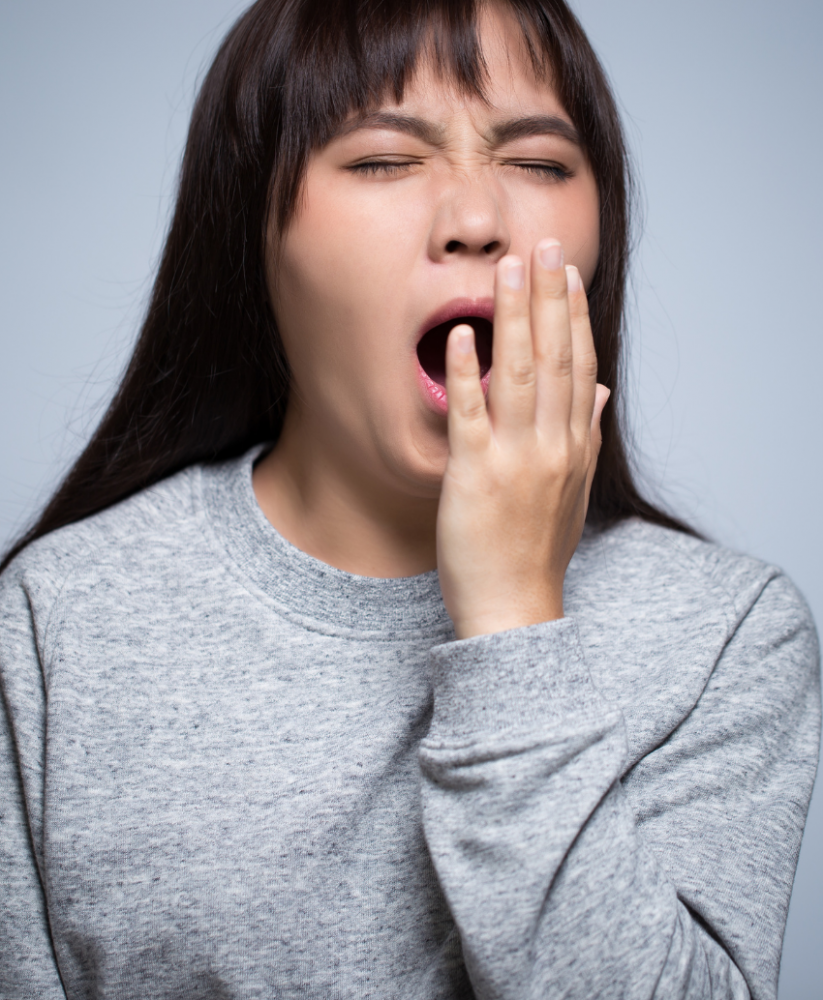![placeholder [add photo].p](/static/imggallery/full/a/abfae83b4b6a2f.png)
Obstructive sleep apnea is a disorder marked by interruptions and pauses in breathing during sleep caused by obstructions in the airway, such as the tongue rolling back in the throat or collapsed tissues in the airway. Untreated sleep apnea can contribute to several serious health conditions, including heart disease, high blood pressure and liver problems.

Signs and symptoms
Sleep apnea must be diagnosed by a sleep physician. But if you suffer from symptoms of sleep apnea, talk to our orthodontist and your physician to start getting the help you need. Common signs of sleep apnea include:
- Extreme drowsiness during the day
- Personality changes and irritability
- Difficulty staying asleep
- Snoring
- Waking up with a very dry or sore throat
- Frequent morning headaches
Treatment
Treatment depends on severity. For mild to moderate obstructive sleep apnea, our orthodontist may recommend a simple oral appliance that fits over your teeth. The appliance keeps your airway open during sleep by stopping the tongue from blocking the air passage or by holding your jaw in a position that prevents airway blockages.
You don’t have to keep suffering alone. For more information on sleep apnea treatment, call us today.
Sleep Apnea FAQ
Sleep apnea is a condition in which your breathing stops periodically during sleep, as many as 20-30 times per hour. Each time you stop breathing in your sleep, the resulting lack of oxygen alerts your brain, which temporarily wakes you up to restart proper breathing. Since the time spent awake is so brief, most people with sleep apnea don't remember it, and many feel like they are getting a good night's sleep when, in fact, they are not. The constant wake-sleep, wake-sleep cycle prevents those with sleep apnea from achieving deep sleep, resulting in a constant drowsy feeling during the day. In growing children, this lack of proper sleep can contribute to daytime irritability, inability to concentrate in school and can significantly inhibit normal growth and development.
The following symptoms can indicate the presence of sleep apnea. If you notice one or more of these, contact our practice.
- Insomnia or difficulty sleeping
- Loud snoring at night
- Waking up at night short of breath
- Snorting or choking sounds during the night (indicating a restart of breathing)
- Headaches upon waking in the morning
- Falling asleep unintentionally during the day
- Extreme drowsiness throughout the day
There are three categories of sleep apnea. The most common is called obstructive sleep apnea (OSA), and occurs due to a physical blockage, usually the collapsing of the soft tissue in the back of the throat. Less common is central sleep apnea (CSA), in which breathing stops because the muscles involved don't receive the proper signal from the brain. And some people suffer from "mixed" or "complex" sleep apnea, which is a combination of obstructive and central.
Obstructive sleep apnea is more common in males than females, and more common in older adults (40+) than younger adults and children. However, anyone — regardless of gender or age — can suffer from sleep apnea. Other risk factors include obesity, smoking, drinking, use of sedatives or tranquilizers, and family history. Central sleep apnea strikes most often in people with heart disorders, neuromuscular disorders, strokes, or brain tumors.
Sleep apnea is considered a serious medical problem and if left untreated can lead to high blood pressure, increasing the risk of heart failure and stroke. The ongoing state of fatigue caused by sleep apnea can lead to problems at work or school, as well as danger when driving or operating heavy machinery. In growing children, sleep apnea inhibits the secretion of growth hormone and this can prevent normal development. Sleep apnea can also cause complications with medication or surgery; sedation by anesthesia can be risky, as can lying flat in bed after an operation. If you know or suspect you suffer from sleep apnea, let your family doctor know before taking prescribed medication or having surgery.
Treatments for sleep apnea depend on the severity of each individual case, and the type of apnea. Basic treatment can be behavioral — for instance, patients are instructed to lose weight, stop smoking, or sleep on their sides instead of on their backs. For patients with narrow airways, orthodontic treatment can be very beneficial in addressing sleep apnea. An orthodontist has the ability to increase airflow by expanding the airway space. In more severe cases, surgery may be the best option.
Contact our practice, and come in for an appointment. We may refer you to a sleep apnea specialist or an oral surgeon and in conjunction with them, work towards the best treatment for your individual case. The specialist may recommend a sleep study to diagnose the precise extent of the problem. From there, we can determine the right path to resolution of your sleep apnea.